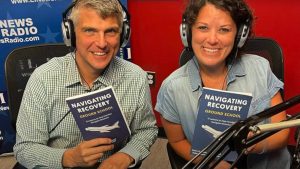
Why Can’t People With Addiction Can’t See Past Their Own Needs?
For families struggling to help a family member suffering with addiction, these questions are all too familiar. Family members may have pleaded with their loved ones to seek care and may have held multiple emotional interventions, only for the addiction to disrupt any movement their loved one makes towards recovery. In these instances, we remind families that while they are working in their loved one’s best long-term interests, their loved one is only operating in the short-term. It is the proverbial ‘can’t see their hand in front of their face’ situation.
When a drug or alcohol addiction takes hold of someone’s life, the person that has been using becomes very near sighted. They can only see a few hours ahead and are not thinking about the distant future.
Most addicts are unable to think of anything but their next score
In the case of those suffering with alcoholism, individuals might be able to remain sober for a few days—Monday, Tuesday and Wednesday—while planning to return to use over the weekend. They might be white-knuckling their way through work and counting down the minutes to a Thursday night Happy Hour and the start of a weekend of “letting-off-steam” binge use.
As alcoholism progresses, the lives of these individuals become more and more myopic. They might have to drink in the morning to stave off withdrawal symptoms. They may be spending most of their day thinking about hiding drinks, planning how to sneak drinks here and there, hiding their drinking behavior from their work, and hiding it from their families. As almost every thought that they have is related to drinking, they no longer make long-term plans for themselves.
Alcoholism is a progressive disease that gets worse and worse over time
For individuals addicted to drugs, this near sightedness may only allow them to see a few hours into their future. Finding their next fix is all that they can think about: getting the money, meeting the dealer, using the drug, and hiding it from their family. They can’t look to the future because the high they’ll be experiencing in the next few hours is fundamental to their lives.
This near-sightedness causes all kinds of chaos. We have witnessed people stealing money from family members and then failing to understand the family member’s upset reaction. We have also witnessed arguments and the breaking down of relationships. It is common for a person suffering with addiction to set appointments to meet friends, only to cancel on them last minute. These cancellations result in frayed friendships. The suffering person cannot see the consequences of their actions, because they are focused on their drug or alcohol use in the short-term.
Why can’t my loved one see how much their addiction hurts me?
Loved ones of every alcoholic have seen near-sightedness play out after a bender. The alcoholic wakes up and is full of remorse, apologetic, and vowing to make a change. That day they may attend an AA meeting, but within a day or two they are back to using. Why can’t they see that they are causing so much damage? Their need to fuel their addiction is much stronger than their resolve. They can’t see how drinking today, will have a negative impact on tomorrow or the following week. Today, they need the drug.
When we host an drug intervention for an addiction, we realize that we are asking an awful lot from the sick person. We are asking them to immediately change their mindset from a short-term focus to long-term planning. We are asking them to spend 30 days in treatment, come out of treatment, enter into an aftercare program, finish school, return to work, and “oh, get some new friends.” The family knows that this is the path their loved one must take to begin long-term recovery that ends with a fulfilling life. If we say to a sick person in an intervention, “We have this great path we’re envisioning for your recovery, you will be in a program for six months,” we will never get a buy in from them. For this reason, we only reveal the recovery plan to the suffering loved one in increments.
Understanding addiction helps us understand addicts
In the first steps of an drug intervention, our only goal is to get the sick loved one into a treatment program or rehab. Once someone is in rehab, they will begin working with a full team of people that will help move the person suffering through the stages of long-term recovery. After a few weeks in treatment, people in rehab feel emotionally and physically healthy enough to begin looking towards the future. At this point, we can start talking with them about longer-term plans.
When considering an drug intervention, understand that your loved one isn’t able to look very far into the future. Plans that will lead to a better and happier life for a sick loved one may make perfect sense to rest of the family, but likely seem farfetched for someone that is only able to discern the path directly ahead of them. By waiting for your loved one to get incrementally healthier, we can reveal plans along the way to help them in their recovery. Ultimately, we must remember to be patient with our patient.
About Adam Banks
Adam Banks is a certified interventionist and the owner of Adam Banks Recovery. After receiving an MBA from the University of Chicago, Adam built a company acquired by United Health Care. His discipline and attention to detail comes from his former career as an airline pilot, holding an ATP, the FAA’s highest license.
Today, Adam is dedicated to helping others achieve long-term sobriety. His work has guided executives, pilots, and physicians on paths to recovery. Adam brings families together through a loving and inclusive approach.
Adam has authored four books on addiction. His recent work, Navigating Recovery Ground School: 12 Lessons to Help Families Navigate Recovery, educates families on the entire intervention process. He also offers a free video course for families considering an intervention for a loved one.
Adam is available for alcohol and drug intervention services in New York, Long Island, the Hamptons as well as nationally and internationally.




